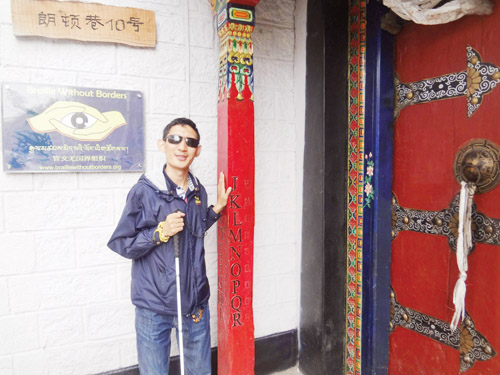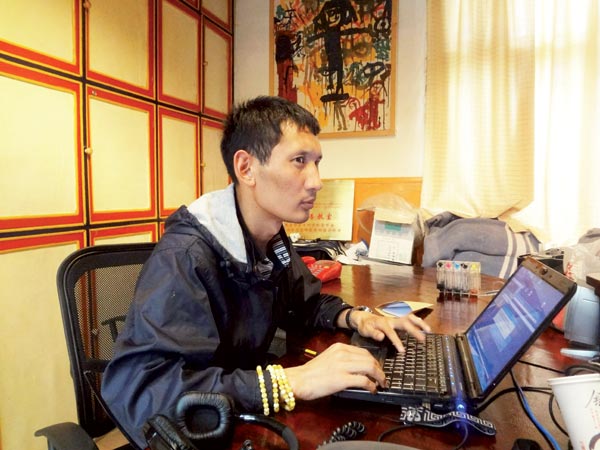Power of the sun
 |
|
Nyima Wangdue is in charge of a school for the blind under the Braille Without Borders Project, in Lhasa, the Tibet autonomous region. Photos by Tanzindrolkar / For China Daily |
 |
|
Nyima considers himself blessed for having the opportunity to receive an education. |
Nyima Wangdue's name means 'powerful sun' in the Tibetan language. He may be blind but he leads a full life, Daqiong and Tanzindrolkar discover in Lhasa.
Although he is unable to see the world with his eyes, he has never abandoned his faith in life.
"Birds are able to fly while human beings are not, so human beings are considered 'disabled' compared to birds," says Nyima Wangdue, 26, the Braille Without Borders Project manager in the Tibet autonomous region.
"Most people are able to see while we are not, so to them, we are 'handicapped'. If you think about it, every creature has their own disabilities, but so what? What really matters is to live to the best of your abilities," he says.
In Tibetan language, Nyima means the sun, and Wangdue means having things under control or power. Like his name, Nyima is like the sunshine to a group of blind children under the Braille Without Borders Project, where he serves with love and passion.
Born in Garze town, Sichuan province, Nyima lost his sight at 3 months old. His father died when he was very young. His mother remarried and left him and his sister with their grandmother.
When he was 13, he met his mother again, who took him to Lhasa to seek a cure for his eyes. He did not regain his vision but met an American doctor in Lhasa who introduced him to a blind school.
That became Nyima's turning point - he received his basic education and over the years, he traveled to many foreign countries for training and meetings.
The school for the blind was founded in 1998 by Sabriye Tenberken from Germany, who was later joined by her partner, Paul Kronenberg. In September 2002, it was officially called Braille Without Borders Project.
The original aim of having the school is to build the confidence of the blind children and help them to be independent. Apart from regular school subjects such as mathematics, English and Chinese, the school provides technical training like massage, Tibetan textile production and cooking. The couple also trains native Tibetans to teach the blind.
"Sabriye and Paul told me they plan to build a larger blind center in India in the future and I'll be put in charge of that school. Sabriye has instilled in me confidence. Nothing is impossible, even though we're blind," says Nyima, who completed a 10-month management course in India.
Nyima considers himself blessed compared to his sister, a laborer, who has never left their hometown.
"If I'm given the choice to see again, I will say no because that means I'll have to change my way of life totally. I'm used to the way I am. And the most important thing is, I don't need my eyes to rebuild my world view and self-worth. I'm happy with the status quo."
Nyima says although he cannot see, he appreciates beauty in his own way.
"When you read novels, you imagine each character and each scene. I also use my imagination to visualize a person. Of course, the images are not merely based on the person's voice. My overall feeling about the person influences my thoughts. So when I say a girl is beautiful, I really mean it."
Nyima often travels alone to various cities to give speeches.
"I like to go out because I can show others how a blind person travels by himself, and I like to express my ideas to different groups of people. Whatever positive impressions I make, will in one way or another, impact blind people," he says.
A devout Buddhist, Nyima believes in karma.

"In Buddism, we believe that all lives are equal. Everyone has to pay for what they have done because of karma, and ultimately, all creatures have an equal amount of pain and joy," he explains.
He admits that some people in Tibet believe that being blind is due to bad karma. "For those who believe that, I hope it will prevent them from doing wrong," he says.
But in recent years, he says the attitude toward the visually impaired has changed for the better in Tibet.
"The students are trained to lead independent lives before we send them to normal schools," he says.
About 100 graduates from their school are now owners or employees of massage parlors and restaurants. One of them runs a kindergarten for blind children in Xigaze.
Nyima says he does not like people who treat the blind with sympathy or are overly protective toward them. "It's not helpful to the blind. I wish they could treat us normally. Overprotection sometimes makes me uncomfortable," he says.
He cites his ex-girlfriend as an example. He fell in love with her because she was straightforward.
Nyima's grandmother was the closest person to him when she was alive. "In her eyes, I'm no different from those who can see. She taught me the importance of loving others and to treat everyone equally. She always said that love can erase all misunderstandings," he adds.






















